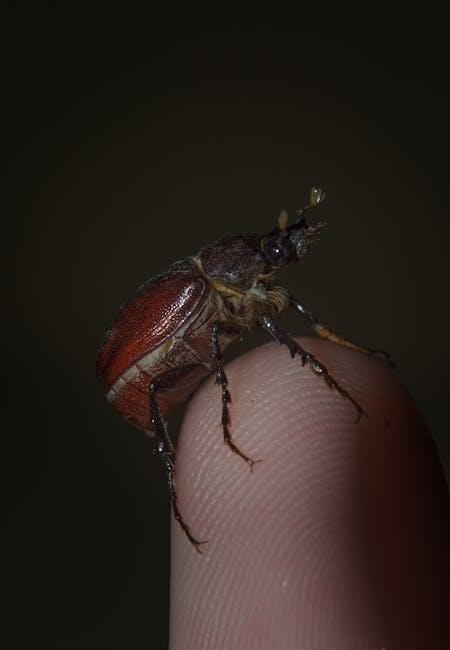The Cadette Eating for You Badge empowers girls to understand the link between nutrition and overall well-being. By completing five steps, participants gain essential knowledge about how diet impacts health, energy, and appearance, fostering a holistic approach to healthy living.
Purpose of the Badge
The Cadette Eating for You Badge is designed to educate girls on the importance of nutrition and its impact on their overall health, energy levels, and appearance. By focusing on how diet influences the body, the badge aims to empower participants with the knowledge and skills needed to make informed food choices. It emphasizes understanding how nutrition supports physical and mental well-being, helping girls develop healthy habits that last a lifetime. The badge also encourages girls to explore the role of food in managing stress, improving sleep, and enhancing skin health, fostering a holistic approach to wellness. Through this badge, girls gain practical insights into creating a balanced diet tailored to their needs, promoting confidence and resilience.

Importance of Nutrition for Teenage Girls
Nutrition plays a vital role in the health and development of teenage girls, as their bodies undergo significant changes during adolescence. A balanced diet provides the necessary nutrients for growth, energy, and mental well-being. Proper nutrition supports the development of strong bones, muscles, and organs, while also aiding in the regulation of hormones. Additionally, healthy eating habits help manage weight, reduce the risk of chronic diseases, and improve cognitive function. For teenage girls, nutrition is also closely linked to mental health, as certain foods can influence mood and stress resilience. By prioritizing nutrient-rich foods, girls can maintain optimal physical and emotional health, setting the foundation for a lifetime of wellness. Understanding the importance of nutrition empowers them to make informed choices that benefit their overall well-being.

Requirements for Earning the Cadette Eating for You Badge
Earn the badge by completing five steps: understanding nutrition’s impact on health, exploring diet’s effect on skin, analyzing diet’s role in stress, identifying sleep-promoting foods, and creating a personalized eating plan.
Step 1: Understanding How Nutrition Impacts Overall Health
Step 1 focuses on understanding the fundamental role of nutrition in maintaining overall health. Girls learn how essential nutrients like vitamins, minerals, proteins, and carbohydrates fuel their bodies, supporting energy levels, growth, and bodily functions. They explore how a balanced diet helps prevent deficiencies and promotes long-term well-being. Activities include researching how different food groups contribute to health and identifying the importance of hydration. This step encourages girls to recognize the connection between their dietary choices and physical health, laying a foundation for making informed decisions. By completing this step, participants gain a clear understanding of how nutrition serves as the cornerstone of a healthy lifestyle, enabling them to prioritize their well-being effectively.
Step 2: Exploring the Connection Between Diet and Skin Health
Step 2 delves into how diet directly influences skin health, highlighting the role of nutrition in maintaining a clear and radiant complexion. Girls learn how certain foods, such as fruits rich in antioxidants and omega-3 fatty acids, can reduce inflammation and promote healthy skin. Conversely, they discover how sugary and processed foods may contribute to breakouts and dullness. Activities include identifying skin-friendly nutrients and creating a skincare-friendly meal plan. This step emphasizes the importance of hydration and balanced eating habits in achieving glowing skin. By understanding the diet-skin connection, participants can make informed choices to enhance their natural beauty and confidence, fostering a positive body image and self-care routine. This knowledge empowers them to nurture their skin from the inside out, aligning with the badge’s holistic approach to health and wellness.
Step 3: Analyzing How Diet Affects Stress Levels
Step 3 focuses on understanding the relationship between diet and stress levels, empowering girls to make food choices that support emotional well-being. They learn how nutrients like complex carbohydrates, vitamins, and minerals play a role in regulating mood and energy. For instance, whole grains and leafy greens can stabilize blood sugar and reduce stress, while processed foods and excessive caffeine may increase anxiety. Participants explore how hydration and meal timing impact stress response and energy levels. Activities include tracking dietary habits and stress levels to identify patterns. This step helps girls recognize how a balanced diet can act as a natural stress-relief tool, promoting resilience and mental clarity. By gaining this insight, they can adopt eating habits that support their emotional health and overall well-being. This knowledge is key to fostering a healthier, more mindful approach to managing stress through nutrition.

Step 4: Identifying Foods That Promote Better Sleep
Step 4 focuses on identifying foods that support better sleep, helping girls understand the dietary choices that enhance rest and recovery. They learn how certain nutrients, such as tryptophan, magnesium, and calcium, promote relaxation and improve sleep quality. Foods like lean proteins, nuts, seeds, whole grains, and dairy products are highlighted for their sleep-enhancing properties. Participants also explore how avoiding stimulants like caffeine and sugary snacks before bed can prevent sleep disruptions. Activities include creating a sleep-friendly grocery list and discussing bedtime routines. By understanding the impact of diet on sleep, girls can make informed choices to improve their rest, leading to better energy levels and overall well-being. This step emphasizes the importance of a balanced diet in maintaining healthy sleep patterns;
Step 5: Creating a Personalized Healthy Eating Plan

Step 5 involves creating a personalized healthy eating plan tailored to individual needs and preferences. Girls learn to assess their dietary habits, set realistic goals, and incorporate nutrient-rich foods into their daily meals. They explore how to balance macronutrients, such as carbohydrates, proteins, and fats, and how to include a variety of fruits, vegetables, and whole grains. Activities include designing a weekly meal plan, creating a grocery list, and experimenting with healthy recipes. The plan should also account for lifestyle factors, like busy schedules or cultural preferences. By developing a practical and sustainable eating plan, girls gain confidence in making healthy choices that support their overall well-being and long-term health goals. This step encourages self-reflection and accountability in maintaining a balanced diet.

Activities to Complete for the Badge
Activities include researching food additives and their health impacts, conducting polls on eating habits, and experimenting with healthy recipes to promote better nutrition and wellness practices.
Researching Food Additives and Their Impact on Health

Researching food additives and their impact on health is a key activity for the Cadette Eating for You Badge. Girls are encouraged to explore how certain additives, such as artificial flavors, colors, and preservatives, affect physical and mental well-being. They will identify common additives in everyday foods and investigate their potential links to stress, anxiety, and energy levels. This activity promotes critical thinking and awareness of how food choices influence overall health. By analyzing product labels and researching credible sources, participants gain insights into making healthier decisions. This step also fosters an understanding of how diet can impact mood and energy, aligning with the badge’s focus on holistic well-being. Through this activity, girls develop essential skills for lifelong healthy eating habits.
Conducting a Poll or Experiment on Eating Habits
Conducting a poll or experiment on eating habits is an engaging activity for the Cadette Eating for You Badge. Girls design surveys to gather data on peers’ food preferences, eating routines, and challenges. They analyze the results to identify patterns and trends, fostering an understanding of how diet impacts daily life. Alternatively, they may conduct experiments, such as tracking energy levels after eating different meals, to observe firsthand how food choices affect physical and mental well-being. This activity encourages critical thinking and collaboration while providing insights into the importance of nutrition. By sharing findings, participants inspire healthier habits within their community, promoting a culture of mindful eating and self-care. This hands-on approach helps girls make informed decisions about their own diets and lifestyles.
Earning the Cadette Eating for You Badge empowers girls to make informed food choices, fostering a deeper understanding of nutrition’s role in overall health and well-being.
Benefits of Earning the Cadette Eating for You Badge
Earning the Cadette Eating for You Badge offers numerous benefits, empowering girls to make informed decisions about their diet and lifestyle. By completing the requirements, participants gain a deeper understanding of how nutrition impacts their health, energy levels, and overall well-being. The badge fosters critical thinking and practical skills, such as creating personalized eating plans and analyzing the effects of diet on stress and sleep. Girls also develop awareness of how food choices influence skin health and long-term wellness. Additionally, activities like researching food additives and conducting polls encourage collaboration and creativity. This badge equips Cadettes with the knowledge and confidence to prioritize healthy habits, setting the foundation for a lifelong commitment to wellness. Ultimately, it helps them cultivate a positive relationship with food and their bodies, promoting self-care and resilience.



